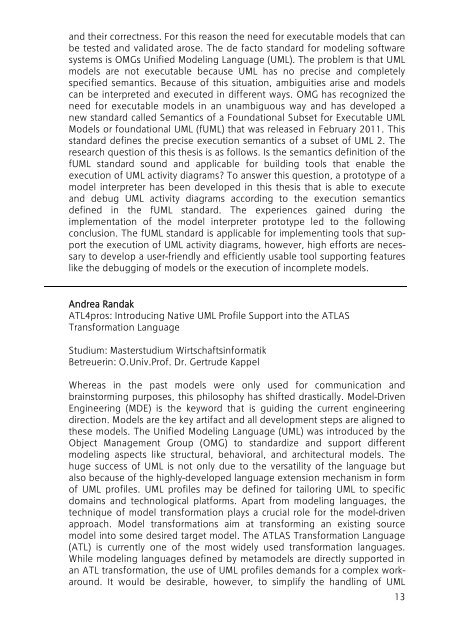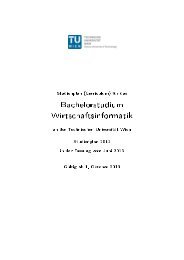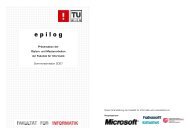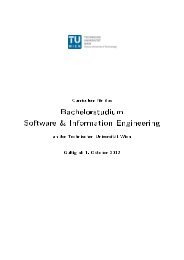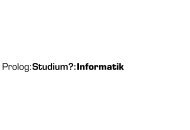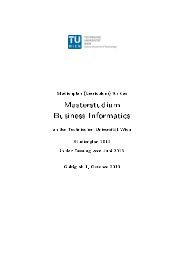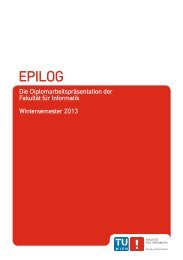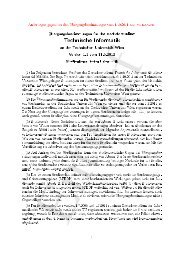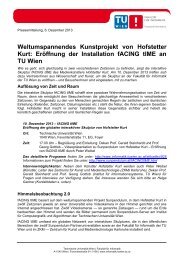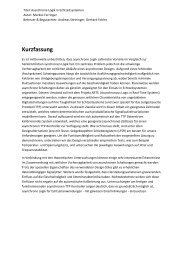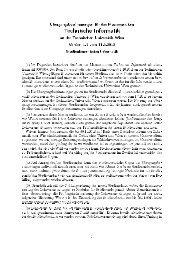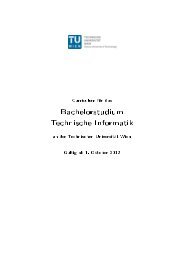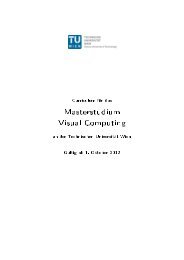Abstract-Band - Fakultät für Informatik, TU Wien - Technische ...
Abstract-Band - Fakultät für Informatik, TU Wien - Technische ...
Abstract-Band - Fakultät für Informatik, TU Wien - Technische ...
Erfolgreiche ePaper selbst erstellen
Machen Sie aus Ihren PDF Publikationen ein blätterbares Flipbook mit unserer einzigartigen Google optimierten e-Paper Software.
and their correctness. For this reason the need for executable models that can<br />
be tested and validated arose. The de facto standard for modeling software<br />
systems is OMGs Unified Modeling Language (UML). The problem is that UML<br />
models are not executable because UML has no precise and completely<br />
specified semantics. Because of this situation, ambiguities arise and models<br />
can be interpreted and executed in different ways. OMG has recognized the<br />
need for executable models in an unambiguous way and has developed a<br />
new standard called Semantics of a Foundational Subset for Executable UML<br />
Models or foundational UML (fUML) that was released in February 2011. This<br />
standard defines the precise execution semantics of a subset of UML 2. The<br />
research question of this thesis is as follows. Is the semantics definition of the<br />
fUML standard sound and applicable for building tools that enable the<br />
execution of UML activity diagrams? To answer this question, a prototype of a<br />
model interpreter has been developed in this thesis that is able to execute<br />
and debug UML activity diagrams according to the execution semantics<br />
defined in the fUML standard. The experiences gained during the<br />
implementation of the model interpreter prototype led to the following<br />
conclusion. The fUML standard is applicable for implementing tools that support<br />
the execution of UML activity diagrams, however, high efforts are necessary<br />
to develop a user-friendly and efficiently usable tool supporting features<br />
like the debugging of models or the execution of incomplete models.<br />
Andrea Randak<br />
ATL4pros: Introducing Native UML Profile Support into the ATLAS<br />
Transformation Language<br />
Studium: Masterstudium Wirtschaftsinformatik<br />
Betreuerin: O.Univ.Prof. Dr. Gertrude Kappel<br />
Whereas in the past models were only used for communication and<br />
brainstorming purposes, this philosophy has shifted drastically. Model-Driven<br />
Engineering (MDE) is the keyword that is guiding the current engineering<br />
direction. Models are the key artifact and all development steps are aligned to<br />
these models. The Unified Modeling Language (UML) was introduced by the<br />
Object Management Group (OMG) to standardize and support different<br />
modeling aspects like structural, behavioral, and architectural models. The<br />
huge success of UML is not only due to the versatility of the language but<br />
also because of the highly-developed language extension mechanism in form<br />
of UML profiles. UML profiles may be defined for tailoring UML to specific<br />
domains and technological platforms. Apart from modeling languages, the<br />
technique of model transformation plays a crucial role for the model-driven<br />
approach. Model transformations aim at transforming an existing source<br />
model into some desired target model. The ATLAS Transformation Language<br />
(ATL) is currently one of the most widely used transformation languages.<br />
While modeling languages defined by metamodels are directly supported in<br />
an ATL transformation, the use of UML profiles demands for a complex workaround.<br />
It would be desirable, however, to simplify the handling of UML<br />
13


